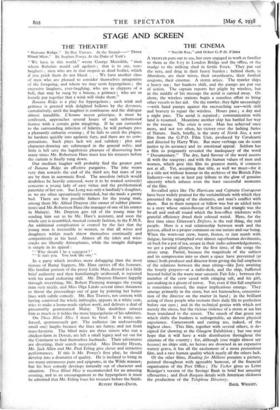THE CINEMA
"North Sea," and Other G.P.O. Films
A TRAWLER puts out to sea, her crew engaged in wotk as familiar to them as the 8.n5 to London Bridge and the "office, or the trudge to the milking shed in fertile Essex. They put out the nets, and drag in their heavy burden ; behind them, in Aberdeen, are their wives, their sweethearts, their football coupons, their cinemas. A storm arises. The trawler ships a heavy sea ; her bunkers shift, and the pumps are put out of action. The captain reports her plight by wireless, but in the middle of his message the aerial is carried away. On shore, the wireless stations begin a ceaseless effort to bring other vessels to her aid. On the trawler, they fight unceasingly —with hand pumps against the encroaching sea—with skill and bravery to repair the wireless. Hours pass ; a day and a night pass. The aerial is repaired ; communication with land is resumed. Meantime another ship has battled her way to the rescue. The crisis is over. Man has achieved 'once more, and not too often, his victory over the lashing furies of Nature. Such, briefly, is the story of North Sea, a new film from the G.P.O. Film Unit, produced by Cavalcanti and directed by Harry Watt. But mere verbiage can do scant justice tp its accuracy and its emotional appeal. Seldom has a film so poignantly revealed the inadequacy of the word "Documentary." The dry, hard flavour of the word assorts ill with the seaspray; and with the human values of men and women, which -give this film its greatest merit, if connects not at all. Yet, accepting that title, as well we Must—for it is a title not without honour in the archives of the British Film Industry—we can at least pay tribute to the glow of genuine sincerity which infuses even the least successful moments of the film.
So-called epics like The Hurricane and Captains Courageous have been widely praised for the verisimilitude with which they presented the raging of the elements, and man's conflict With them. But in them tempest or billow was but an added taste to a story whose onion-flavour of fiction and triangle Was the be-all and end-all round which the box-office tricksters with grateful efficiency dreed their colossal weird. Here, for the first time since Grierson's Drifters, is the real thing, the real people. Here is a real relationship between work and the person, allied to a proper comment on our nature and our being. When the worn-out crew, burnt, frozen, or just numb with fatigue, having triumphed over almost superhuman devilments, sit back for a pot of tea, secure in their radio acknowledgements, we get a partial glimpse, for the first time, of the songs the sirens sang. Partial, because the magnitude of the subject and its compression into so short a space have prevented (at times) both producer and director frcim giving the full emphasis of the relations between the man sitting—like Joie awaiting the hourly prayers—at a radio-desk, and the ship, buffetted beyond belief in the waste near sarcastic Fair Isle ; between the member of the crew cased with stinging salt, and his girl, net-making in a gloom of terror. Yet, even if this full emphasis is sometimes missed, the major implications emerge. They emerge primarily in the stern; but not hiunourless, concentra- tion of the director on the matter in hand ; in the brilliant acting of these people who recreate their daily life to perfection before our eyes ; and in the technical genius with Which not merely the stress, but the vicious violence of a storm at sea has been translated to the screen: The smash of that green sea which shifts the bunkers is unforgettable, an almost physical experience. Camerawork and cutting are, indeed, of the highest class. This film, together 'with several others; is de- signed for showing at the Glasgow Exhibition ; but one may hope that it will have a wide distribution' throughout the cinemas of the country ; for, although (one 'Might almost say because) no ships sink, no heroes are drowned in an expensive watery grave, it has all the excitement of a mote pretentious film, and a rare human quality which nearly all the others lack.
Of the other films, Banking for Millions- presents a -picture, pointed throughout with 'agreeable humour, of the financial organisation of the Post Office ; The Tocher gives us Lone Reiniger's version 'of- the SavingS. Bank in brief but -amusing silhouettes ; and Book Bargain details With American'sliekness
the production of the Telephone Directory. ' •'
BASE.'WRIGHT.'


































































 Previous page
Previous page